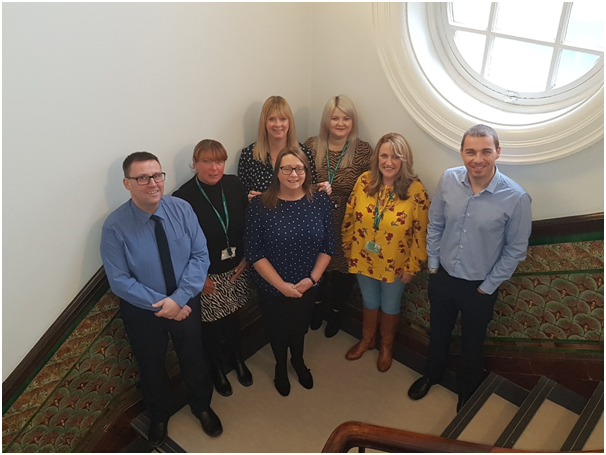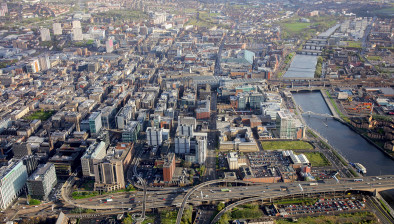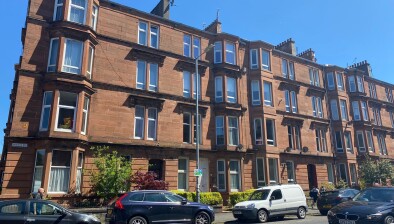Glasgow leads the way supporting vulnerable families living in the PRS
A unique service within Glasgow City Council is working with families living in the city’s private rented sector (PRS) to prevent homelessness and address issues relating to child poverty.

The team at the council’s Private Rented Sector Support Hub (Housing & Welfare Team) is part of the council’s DRS – Housing and Regeneration Services.
The only local authority in Scotland to provide such a service, the ultimate aims of the team are to prevent homelessness and address child poverty through placing families on a stronger, more supported footing where they are able to self-manage and move out of crisis.
The Private Rented Sector Support Hub (PRS Hub) provides the focus for a holistic and multi-agency support service, clustered around the importance of an affordable and decent quality home.
The hub has developed strong and effective relationships with partner organisations to support tenants, particularly families with children, residing in the private rented sector, many of whom are living in poverty which is exacerbated by the welfare reforms. The team plays a key role in delivering services that work towards the prevention of homelessness, which is a key objective of the city’s Rapid Rehousing Transition Plan.
The Hub has main areas of work where it has achieved successful outcomes (preventing homelessness; improving people’s financial position; helping with mental health and wellbeing issues; and improving the safety and quality of accommodation) for people living in private rented sector housing. This list is not exhaustive as the team strive to identify services in the city to support vulnerable families living in the PRS.
The team has a 100% engagement rate with the families, many of whom are at significant risk of homelessness. The team takes a pro-active ‘Housing Options’ approach, which has proven to be successful in working with previously hard to reach households (the Hub team are often the first officers of any agency that the families have dealt with) who are willing to engage with support and services, and that the considerable poverty being experienced by these families can be alleviated. Around 300 families have been helped so far by the PRS Support Hub team.
Many referrals to the service come from across the council and a variety of other agencies (housing and homelessness organisations, health visitors, social workers, and others). As well as looking at the tenant’s financial situation, they also look at housing and personal needs, to ensure families are enabled to either sustain their current private rented tenancy or are offered advice and support enabling them to pursue other re-housing options.
What makes the PRS hub so successful is the robust case management approach undertaken by the team. Their one-to-one engagement and follow-up is what keeps these people on the pathway out of crisis, rather than just onward referrals and then falling ‘off the radar’ if they don’t make appointments or contact other organisations.
Housing is at the heart of the matter but what the team does is much more encompassing – benefits entitlement, employability, childcare, necessities, etc. Some of the families contact the team again (after case closure) as they face other challenges and need additional support.
Another unique feature of the Hub is their inspection of the condition of properties to ensure landlords meet their obligations in respect of the required repairing standard which includes adequate smoke alarms, heat detection and Carbon Monoxide (CO) monitors and any other repair issues/concerns raised by the tenant. They also ensure that the landlord’s registration is up to date and accurate.
The actions of the Hub, which show that the focus is on people as much as property, have made £4.7 million in ‘preventative’ costs to the council’s homelessness services, ie the costs that would have been incurred had the families the team has supported gone on to present to HSCP as homeless.
A key point with regard to the £4.7m figure is that families have themselves been saved great emotional and financial stress from avoiding homelessness, have had tenancies secured and have been/are being supported out of crisis so that they can begin to rebuild their lives.
The majority of the families supported are already in crisis when they meet the team and as such, prior to their intervention, had feared that homelessness would be their only option.
An increasing number of families are claiming Universal Credit, with the PRS Hub team now working “reactively” when this arises to prevent escalation by landlords due to delay in rent payments caused by the assessment period.
Critically, successful partnership working with the DWP has enabled support to be provided to the most vulnerable families, with referrals coming directly from local job centres.
Generally, landlords respond positively to providing ‘grace periods’ on rent issues to organising repairs/replacements/carrying out safety work. Critical safety issues identified are immediately referred to Scottish Fire & Rescue Service for action.
Councillor Kenny McLean, city convener for neighbourhoods, housing and public realm, said: “Our PRS Hub provides a unique and invaluable service to families in private rented accommodation, many of whom are facing financial difficulties through no fault of their own.
“While their priority is preventing these families from becoming homeless, the team also gives much more support in order to ensure that people are settled in their homes and can look to the future with much more confidence.
“Their pro-active approach, and a strong working relationship with partner agencies, is a model that other local authorities are looking at closely.”
For further information on the services provided by the team, please contact Pauline McGarry PRS Support Hub service delivery manager (Pauline.McGarry@glasgow.gov.uk).







